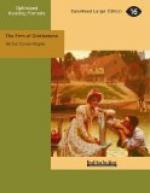CHAPTER VII.
ENGLAND VERSUS SCOTLAND.
The rectorial election had come and had gone, but another great event had taken its place. It was the day of the England and Scotland Rugby match.
Better weather could not have been desired. The morning had been hazy, but as the sun shone out the fog had gradually risen, until now there remained but a suspicion of it, floating like a plume, above the frowning walls of Edinburgh Castle, and twining a fairy wreath round the unfinished columns of the national monument upon the Calton Hill. The broad stretch of the Prince’s Street Gardens, which occupy the valley between the old town and the new, looked green and spring-like, and their fountains sparkled merrily in the sunshine. Their wide expanse, well-trimmed and bepathed, formed a strange contrast to the rugged piles of grim old houses which bounded them upon the other side and the massive grandeur of the great hill beyond, which lies like a crouching lion keeping watch and ward, day and night, over the ancient capital of the Scottish kings. Travellers who have searched the whole world round have found no fairer view.
So thought three of the genus who were ensconced that forenoon in the bow windows of the Royal Hotel and gazed across the bright green valley at the dull historical background beyond. One we already know, a stoutish gentleman, ruddy-faced and black-eyed, with check trousers, light waistcoat and heavy chain, legs widely parted, his hands in his pockets, and on his face that expression of irreverent and critical approval with which the travelled Briton usually regards the works of nature. By his side was a young lady in a tight-fitting travelling dress, with trim leather belt and snow-white collar and cuffs. There was no criticism in her sweet face, now flushed with excitement— nothing but unqualified wonder and admiration at the beautiful scene before her. An elderly placid-faced woman sat in a basket chair in the recess, and looked up with quiet loving eyes at the swift play of emotions which swept over the girl’s eager features.
“Oh, Uncle George,” she cried, “it is really too heavenly. I cannot realize that we are free. I can’t help fearing that it is all a dream, and that I shall wake up to find myself pouring out Ezra Girdlestone’s coffee, or listening to Mr. Girdlestone as he reads the morning quotations.”
The elder woman stroked the girl’s hand caressingly with her soft, motherly palm. “Don’t think about it,” she murmured.
“No, don’t think about it,” echoed the doctor. “My wife is quite right. Don’t think about it. But, dear me, what a job I had to persuade your guardian to let you go. I should have given it up in despair—I really should—if I had not known that you had set your heart upon it.”
“Oh, how good you both are to me!” cried the girl, in a pretty little gush of gratitude.




